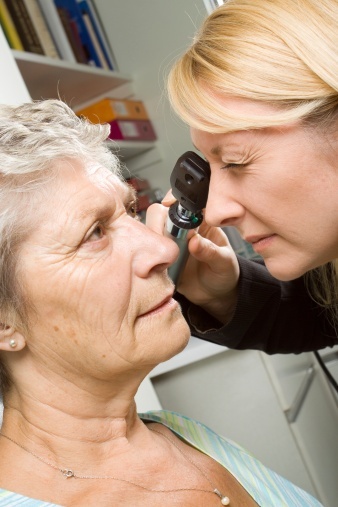By Kate Ranta on Mar 22, 2016 @ 05:09 PM
According to the National Eye Institute, macular degeneration causes vision loss due to damage to the macula, which is important for central vision. The rate of progression of the condition depends on the patient. Patients commonly experience a blurred area in the center of their vision. The result of macular degeneration is not complete blindness. But, it still impacts the ability to perform everyday activities, like driving and cooking.
Risk factors
Risk factors for macular degeneration include:
- Age
- Smoking
- Race (more common for Caucasians)
- Family history
- Nutrition
Detection
At the earliest stage of the condition, there are no symptoms. This means that it will only be detected by a comprehensive eye exam. Your doctor may perform the following tests:
- Visual acuity test.
- Dilated eye exam. This allows the doctor to look at your retina and optic nerve for signs.
- Amsler grid exam. This checks to see if issues with your central vision make the grid lines in your eyes disappear or look wavy. Both signs of macular degeneration.
- Fluorescein angiogram. This identifies leaking blood vessels in your eye.
- Optical coherence tomography. This uses light waves to create images of your eye. The doctor is looking for yellow deposits, which, depending on their size, may indicate the disease.
It is possible to have it in one or both eyes. Early diagnosis is important. If you have a family history, or are high risk for another reason, don’t wait for vision changes to meet with an eye care professional. It is important to have your eyes examined regularly.
Treatment
Treatment depends on what stage of the disease you are in. If you have detected it early, you can take steps now to reduce the chance of having vision loss in the future. Quitting smoking, eating healthy and exercising can decrease the rate of progression of the disease. It is also important to have a dilated eye exam annually to evaluate the disease’s advancement.
Nutritional supplements have been found to be helpful to some patients. Although they won't cure the disease or restore vision, the supplements can slow vision loss. Higher doses of vitamin C, vitamin E, zinc, copper and beta-carotene have been shown to reduce the progression. It’s important to realize that the dosages of these supplements are higher than what you might be taking in your regular daily multivitamin. Make sure you get your doctor’s approval before starting any supplements.
For patients with advanced macular degeneration, different treatments are available to stop additional vision loss. Again, the treatments do not provide a cure or restore previously lost vision. Options include:
- Injections to stop the growth of abnormal blood vessels.
- Laser treatment of the retina so these vessels are closed off.
- Laser surgery to destroy these vessels.
A diagnosis of this disease can occur without experiencing any symptoms. The disease does not cause pain and can be diagnosed before any vision loss occurs. Although a cure does not currently exist, treatment options are available to slow the progression of the disease. Therefore, early diagnosis by an eye care professional is important.





comments